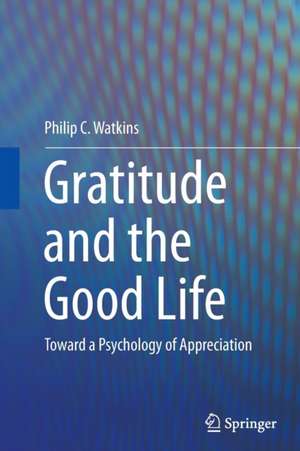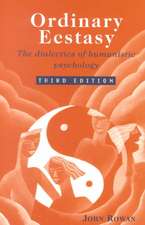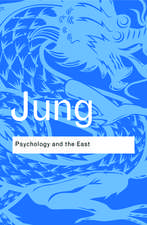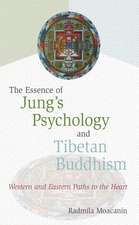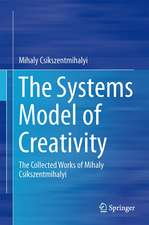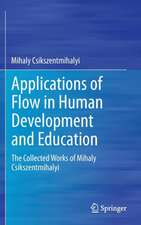Gratitude and the Good Life: Toward a Psychology of Appreciation
Autor Philip C. Watkinsen Limba Engleză Paperback – 27 aug 2016
After providing a lucid understanding of gratitude, this volume explores the many aspects of well-being that are associated with gratitude. Moreover, experimental work has now provided promising evidence to suggest that gratitude actually causes enhancements in happiness. If gratitude promotes human flourishing, how does it do so? This issue is addressed in the second section of the book by exploring the mechanisms that might explain the gratitude/well-being relationship. This book provides an up to date account of gratitude research andsuggested interesting paths for future research, all while providing a theory of gratitude that helps make this information more understandable.
This book is very valuable to gratitude investigators, as well as all who are interested in pursuing this line of research, students and scholars of emotion and well-being and instructors of positive psychology courses and seminars.
| Toate formatele și edițiile | Preț | Express |
|---|---|---|
| Paperback (1) | 452.52 lei 38-45 zile | |
| SPRINGER NETHERLANDS – 27 aug 2016 | 452.52 lei 38-45 zile | |
| Hardback (1) | 591.23 lei 38-45 zile | |
| SPRINGER NETHERLANDS – 11 oct 2013 | 591.23 lei 38-45 zile |
Preț: 452.52 lei
Preț vechi: 565.65 lei
-20% Nou
Puncte Express: 679
Preț estimativ în valută:
86.60€ • 90.30$ • 71.97£
86.60€ • 90.30$ • 71.97£
Carte tipărită la comandă
Livrare economică 17-24 martie
Preluare comenzi: 021 569.72.76
Specificații
ISBN-13: 9789401778565
ISBN-10: 9401778566
Pagini: 259
Ilustrații: X, 259 p. 10 illus.
Dimensiuni: 155 x 235 x 14 mm
Greutate: 0.39 kg
Ediția:Softcover reprint of the original 1st ed. 2014
Editura: SPRINGER NETHERLANDS
Colecția Springer
Locul publicării:Dordrecht, Netherlands
ISBN-10: 9401778566
Pagini: 259
Ilustrații: X, 259 p. 10 illus.
Dimensiuni: 155 x 235 x 14 mm
Greutate: 0.39 kg
Ediția:Softcover reprint of the original 1st ed. 2014
Editura: SPRINGER NETHERLANDS
Colecția Springer
Locul publicării:Dordrecht, Netherlands
Cuprins
Chapter 1. Introduction: Why a Science of Gratitude.- Part I. The “What” of Gratitude.- Chapter 2. What is Gratitude and How can it be Measured?.- Chapter 3. What Causes Gratitude?.- Chapter 4. What Good is Gratitude? Gratitude and Well-Being.- Chapter 5. What are Grateful People Like? Characteristics of Grateful People.-Part II: The “How” of Gratitude: How is Gratitude Related to Well-Being?.- Chapter 6. Does Gratitude Enhance Present Experience?.- Chapter 7. Does Gratitude Enhance Experience of the Past?.- Chapter 8. Does Gratitude Enhance Social Well-Being?.- Chapter 9. Does Gratitude Enhance Coping Ability?.- Chapter 10. Does Gratitude Prevent Negative Affectivity?.- Chapter 11. How Does Gratitude Develop?.- Chapter 12. What Inhibits Gratitude?.- Chapter 13. How can Gratitude Interventions Be Used to Enhance Well-Being?.- Chapter 14. Conclusion: Explaining Gratitude.
Recenzii
From the book reviews:
“The book’s 14 chapters are organized in two parts, including an introductory chapter. … As an academic, research-oriented work, it is sold as a technical text; however, much of the content would be of interest to the well-educated public. … I strongly recommend this book.” (Dolores E. McCarthy, PsycCRITIQUES, Vol. 59 (32), August, 2014)
“Watkins (Eastern Washington Univ.) has written a comprehensive, well-organized, engaging book on gratitude as essential emotion, trait, and mood state. … This 14-chapter book has three sections. … Summing Up: Highly recommended. Upper-division undergraduates through faculty and professionals.” (D. S. Dunn, Choice, Vol. 51 (7), March, 2014)
“The book’s 14 chapters are organized in two parts, including an introductory chapter. … As an academic, research-oriented work, it is sold as a technical text; however, much of the content would be of interest to the well-educated public. … I strongly recommend this book.” (Dolores E. McCarthy, PsycCRITIQUES, Vol. 59 (32), August, 2014)
“Watkins (Eastern Washington Univ.) has written a comprehensive, well-organized, engaging book on gratitude as essential emotion, trait, and mood state. … This 14-chapter book has three sections. … Summing Up: Highly recommended. Upper-division undergraduates through faculty and professionals.” (D. S. Dunn, Choice, Vol. 51 (7), March, 2014)
Notă biografică
Philip C. Watkins has been conducting research on gratitude since 1995 and have been cited as one of the pioneers in the science of gratitude. Since 2000 he has published 11 papers on gratitude, and have presented more than 50 gratitude research papers at national, international, and regional conferences. His research has been focused on understanding the factors that cause gratitude, and how gratitude enhances subjective well-being. His work has been covered in a number of national media outlets, including Ladies Home Journal, The Washington Post, Self, Redbook, and Psychology Today. Before turning his research energies to gratitude he focused on memory processes in depression, where he still maintains some interest. This research program resulted in three articles that were published in the Journal of Abnormal Psychology. Philip Watkins completed his undergraduate education at the University of Oregon, and went on to receive his M.A. and Ph.D.at Louisiana State University in clinical psychology. He completed his clinical internship at the University of Southern California Medical School. After joining the Psychology Department of Eastern Washington University as an assistant professor in 1990, he received early tenure and promotion to associate professor in 1995, and was promoted to full professor in 1999.
Textul de pe ultima copertă
This book provides clear and sometimes surprising answers to why gratitude is important to living well. The science of gratitude has shown much growth in the last ten years, and there is now sufficient evidence to suggest that gratitude is one of the most important components of the good life. Both correlational and experimental studies have provided support for the theory that gratitude enhances well-being.
After providing a lucid understanding of gratitude, this volume explores the many aspects of well-being that are associated with gratitude. Moreover, experimental work has now provided promising evidence to suggest that gratitude actually causes enhancements in happiness. If gratitude promotes human flourishing, how does it do so? This issue is addressed in the second section of the book by exploring the mechanisms that might explain the gratitude/well-being relationship. This book provides an up to date account of gratitude research andsuggested interesting paths for future research, all while providing a theory of gratitude that helps make this information more understandable.
This book is very valuable to gratitude investigators, as well as all who are interested in pursuing this line of research, students and scholars of emotion and well-being and instructors of positive psychology courses and seminars.
After providing a lucid understanding of gratitude, this volume explores the many aspects of well-being that are associated with gratitude. Moreover, experimental work has now provided promising evidence to suggest that gratitude actually causes enhancements in happiness. If gratitude promotes human flourishing, how does it do so? This issue is addressed in the second section of the book by exploring the mechanisms that might explain the gratitude/well-being relationship. This book provides an up to date account of gratitude research andsuggested interesting paths for future research, all while providing a theory of gratitude that helps make this information more understandable.
This book is very valuable to gratitude investigators, as well as all who are interested in pursuing this line of research, students and scholars of emotion and well-being and instructors of positive psychology courses and seminars.
Caracteristici
Provides clear answers to why gratitude is important to living well The first book to bring a comprehensive analysis of gratitude research Gives clear suggestions for future research on gratitude Includes supplementary material: sn.pub/extras
